SWU: Social Work’s Six-Point Urgent Action Plan
The UK’s social work system faces collapse as a third of social workers look to leave the profession, according to data collated by the Social Workers Union (SWU). [1]
A survey of SWU members found that all areas of the UK face an avalanche of referrals as lockdown eases. However, it also found that government and employers have neglected social workers’ concerns during the COVID-19 pandemic and failed to safeguard their physical and mental health. [2]
Key findings from the report reinforce the issues identified in an increasing number of calls to the SWU’s helplines:
- The risk of hidden tragedies with many (49%) social workers frightened that the most vulnerable people have been unable to be reached through digital interventions.
- Almost a tenth of social workers felt that agency staff were used as a “human shield” to protect permanent staff from going into unsafe situations.
- Unscrupulous managers threatened staff who do not comply with unsafe instructions with the sack, over 11% of social workers have been threatened explicitly or through veiled threats with disciplinary action for complaining about unsafe situations.
- 54% felt that PPE was inadequate with a third of social workers having to provide their own face masks. Risk assessments were also rated as ineffective by 51% of social workers and the Social Workers Union took the unprecedented step of recommending frontline staff should perform their own risk assessments to make sure they are safe.
- Two-thirds of social workers report deteriorating mental health as the impact of dealing with caseloads and the work required takes its toll. Many have witnessed significant death rates among their clients and are receiving inadequate support in dealing with grief.
- The expected deluge of demand of referrals to social services and required assessments as lockdown continues to ease (exacerbated by the potential pitfalls of staffing levels caused by the build-up of annual leave and TOIL among two-thirds of social workers and continued shielding of one in ten experienced social workers).
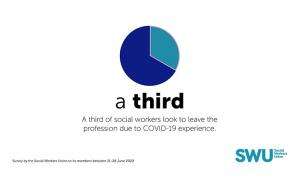
Government and social work employers must take immediate short-term steps set out in this Six-Point Action Plan.
This includes increased mental health support, guaranteed PPE, a social work recruitment drive and a pledge not to re-introduce austerity measures.
This should be coupled with a long-term approach to introduce measures set out in a “working conditions toolkit”, developed by the Union, Bath Spa University and the British Association of Social Workers. [3]
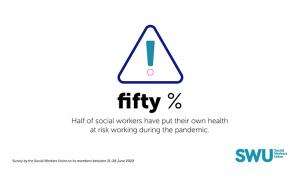
Action One
Adequate PPE and risk assessments are a basic minimum requirement of social workers reporting to work.
Following reports of inadequate PPE and risk assessments, with social workers having to provide their own face masks and the Social Workers Union taking the unprecedented step of recommending front line staff should perform their own risk assessments, urgent action is required.
The Government must make certain that social workers are supplied with adequate PPE and employers need to ensure they are made available to all frontline social workers, both for work and for their commute on public transport.
Employers, through their managers, must be made responsible for carrying out effective risk assessments for all frontline social workers, in particular those carrying out home visits and face to face meetings.
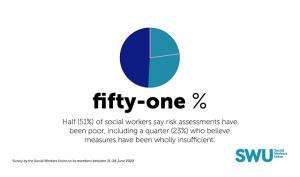
Action Two
Mental health support must be urgently ramped up.
There has been inadequate support for social workers dealing with grief. Many are working with sick and elderly people and have witnessed significant death rates among their clients. In addition, a lack of interaction with colleagues and an inability to share and discuss experiences have all had an impact on social workers’ mental wellbeing.
Specialist mental health social work has become more prominent in the service, and employers now need to ensure that more social workers are able to develop and acquire basic mental health skills, in supporting themselves and to some extent those around them, including colleagues and clients.
The Government must make certain that all social work employers provide adequate counselling and support for social workers experiencing the heightened stresses caused by this pandemic.
Managers should have the training and aptitude to recognise the effects of stress on front line social workers and dealing with it appropriately, as part of their responsibility.
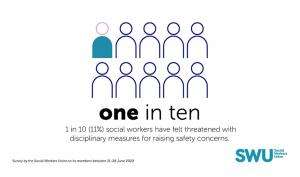
Action Three
Employers must anticipate and plan for a surge in workload.
The expected surge in demand of referrals to social services and required assessments as lockdown continues to ease requires foresight.
This will be exacerbated by the potential shortfall in staffing levels due to build-up of annual leave, continued shielding of experienced social workers and regrettably some leaving the sector due to their COVID-19 experience.
Employers now need to fortify their workforce and a nationwide recruitment campaign must be implemented urgently.
There needs to be a focus on recruiting more qualified permanent members of staff to ensure more people come into the sector.
Agency staff should also be considered, but with full recognition of their employment rights (see Action Four).
New social workers will require additional positive mental health support including meaningful supervision.
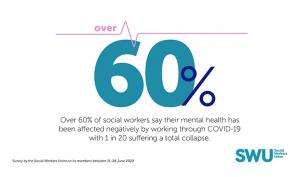
Action Four
Parity for agency staff must be implemented immediately.
The evidence shows that agency staff have been used as a “human shield” to protect permanent staff from going into unsafe situations, with unscrupulous managers threatening staff who do not comply with the sack. This has decimated morale, and employers need to do better.
This is an issue which the Black, Asian and minority ethnic (BAME) community have felt particularly strongly as they are almost three times more likely to be agency staff than permanent employees. [4]
There is an urgent need for parity in how agency staff are treated.
For too long people have been treated like second class employees and that needs to change.
Employers must understand that to improve morale across their team, every member of staff, agency and permanent, needs to feel valued.
There is also a need for greater dialogue between agencies providing staff and the employer to ensure consistency in the advice given to agency staff and those employed directly by local authorities.
We would also strongly encourage agency staff to become unionised through the Social Workers Union and be active within their union.
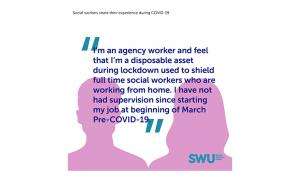
Action Five
Taking a holistic view of policy and a permanent end to austerity measures.
The government needs to take a holistic look at this issue, and realise that on a broader level, the deluge of referrals predicted is as a result of the poverty and inequality experienced by service-users.
Many have been impacted by the austerity measures of the last recession, have now had no access to support in lockdown, and will have little additional support post-pandemic - without sufficient government funding. Women’s Aid refuges, mental health support, youth services need to have funding re-instated to pre-austerity levels.
Action to support social workers must be coupled with urgent implementation of policies to end child poverty, fuel poverty and support the most vulnerable through the benefits and welfare system.
There must be urgent and major investment within and beyond local authorities, if social work is to play its fullest, necessary leading part in the recovery in communities across the country.
Social work has always been the ‘poor relation’ in public services, and this needs to change.
When public health strategy and national governmental decisions are scrutinised, the role of social workers in recovery and future emergency and public health planning needs to be recognised.
There can be no effective public health strategy without social health, and social workers must be seen as critical to the health of the nation.
We cannot ignore the huge funding gap that exists in social work. Moreover, moves to invest in a centralised NHS cannot come at the expense of local social care yet again.
There needs to be a collective realisation across all layers of government of the value of social work, and any bias addressed.
Action Six
Strike a balance between on and offline support.
There is real risk of hidden tragedies among people that use services, with many social workers worried that their most at risk clients have not been reached through digital interventions.
Social workers are conflicted by their want to connect with and support their most at risk clients, amid the restrictions to physical visits.
Employers must protect frontline, face-to-face contact, but at the same time innovation should be encouraged.
Guidance for engaging with service users through social media, telephone, writing letters, notes through letterbox should be developed.
Outreach should take place to find locations where physically distanced support can be delivered and those most in need identified. This should include foodbanks, befriending services, etc. Partnerships to ensure vulnerable people have access to IT should be encouraged (such as working with charities and social enterprises like SocialBox.Biz).
Employers should encourage use of peer support and team meetings to exchange ideas and ways of working - positives & negatives. Acknowledging that some clients will not cooperate and will not want to be contacted.
[1] 363 social workers completed the survey issued by the Social Workers Union to its members between 21-28 June 2020.
[2] 67% of respondents to the survey say they expect a massive increase in referrals to social services as lockdown continues to
ease with an additional 27% expecting a slight increase.
[3] For more information, visit https://www.basw.co.uk/what-we-do/campaigns/professional-working-conditions
[4] Further analysis of the BAME data will be released at a later date.